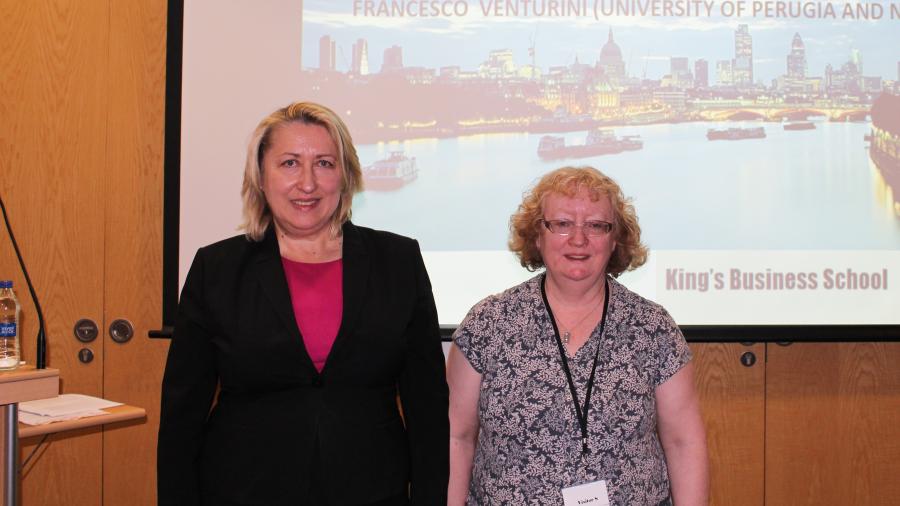Technology and heterogeneous capital: explaining the decline of the labour share
About the ESRI Seminar Series
The ESRI organises a public seminar series, inviting researchers from both the ESRI and other institutions to present new research on a variety of public policy issues. The seminar series provides access to specialised knowledge and new research methodologies, with the objective of promoting research excellence and facilitating productive dialogue across the policy and research fields.
Slides from this event are now available here.

From left: Iulia Siedschlag, ESRI, and Mary O'Mahony, King's College London
Guest Speaker: Mary O'Mahony, Professor of Applied Economics at King's College London
Venue: ESRI, Whitaker Square, Sir John Rogerson’s Quay, Dublin 2.
Seminar Topic:
We investigate the decline of the labour share in a world characterized by rapid technological changes and increasing heterogeneity of capital assets. Our theoretical model allows for these assets to affect the labour share in different directions depending on the capital-labour substitution/complementary relationship and the workers’ skill level. We test the predictions of our model using a large cross-country, cross-industry data set, considering different forms of tangible and intangible capital inputs. Our results show that, over the 1970-2007 period, the decline of the labour share has been mainly driven by technical change and ICT assets, mitigated by increasing investments in R&D-based knowledge assets. Using new information on intangible capital we find that, in more recent years (from 1995 onwards) innovative properties increase the labour share while economic competencies contribute to its decline, particularly for the low and intermediate skilled workers. Our results are robust to an array of econometric issues, namely heterogeneity, cross-sectional dependence, and endogeneity.
Speaker Bio:
Mary O’Mahony is Professor of Applied Economics, King’s College London, a visiting fellow at the National Institute of Economic and Social Research (NIESR) in London, and a research associate of ZEW, Mannheim, Germany. Her research interests include measuring and explaining international differences in productivity, technology and growth; human capital formation and its impacts on productivity and measuring performance in public services, including health and education. She has participated and coordinated many EC funded projects including the EU KLEMS productivity accounts. She is a researcher with the Economic Statistics Centre of Excellence (ESCoE), which is a collaboration with the Office for National Statistics of the United Kingdom. Her publications include papers in the Economic Journal, the Journal of Economic Perspectives, the Review of Income and Wealth, Labour Economics, and Research Policy.